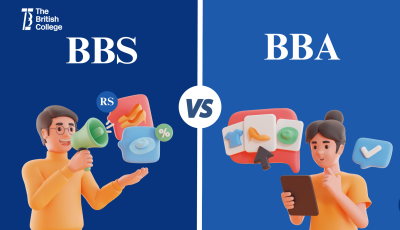Best Colleges for Masters in IT Nepal: Compare Top Programmes and Choose Your Path in 2025

In 2025, Nepal’s IT education landscape is booming. The demand for skilled professionals is growing at nearly 15% annually, driven by digital transformation across finance, health, and education sectors. Yet, with more than 25 colleges offering a Master’s in IT education, choosing the right one can feel overwhelming.
If you’re exploring Masters in IT Nepal options, you’re not alone. Every year, thousands of students compare universities, international affiliations, calculate fees, and look for the best return on their investment. Selecting the right programme will decide your career advancement. We have analysed the top programmes in Nepal, comparing their curriculum, costs, and career outcomes. Our goal is to provide a clear, data-backed comparison to help you choose the best college to study Masters in IT Nepal.
Which Colleges in Nepal Offer the Best Masters in IT Programmes?
When comparing masters in IT Nepal options, the top institutions combine academic rigour, global recognition, and strong career outcomes. Postgraduate information technology education in Nepal primarily divides into two categories: programmes affiliated with prominent Nepali universities and those offered through international collaborations.
University-Affiliated Programmes vs International Collaborations in Nepal
The biggest decision you face when choosing Masters in IT Nepal is whether to pursue a purely local degree or one resulting from an international collaboration in education.
- Local university programmes, following the University Grants Commission Nepal curriculum, emphasise theoretical fundamentals like database management and software engineering through a Nepal-centric lens.
- International collaborations bring curricula designed for global markets. The MSc IT British College’s Leeds Beckett programme, for example, includes modules on enterprise architecture and digital transformation that reflect UK industry standards. Faculty often include international visiting professors, and assessment methods mirror Western universities.
Tribhuvan University vs Kathmandu University vs Pokhara University IT Programmes
These programmes, such as the MIT programme under Tribhuvan University (TU) or the MTech IT programme at Kathmandu University (KU), are well-established and generally more budget-friendly. They focus heavily on fundamental computer science and technical research.
| University | Programme Name | Core Focus |
| Kathmandu University (KU) | Master of Technology in Information Technology (MTech IT) | Research-focused with strong engineering integration |
| Tribhuvan University (TU) | Master of Information Technology (MIT) | Long-standing academic authority with national credibility |
| Pokhara University (PU) | M.Sc. Computer Science / MCIS | Practical orientation and regional reach |
While these public universities offer affordability and accreditation, their curricula can sometimes lag behind global industry trends. That’s where partnership colleges step in.
International Partnership Programmes Available in Nepal
The MSc IT British College's partnership with Leeds Beckett University (LBU) delivers a transformational experience. Students receive a UK degree while studying in Kathmandu. The curriculum updates annually to reflect global IT trends, covering cloud computing, cybersecurity, and data analytics.
These international partnerships provide tangible benefits beyond the degree. You gain access to online resources from UK universities, participate in exchange programmes, and join global alumni networks. Furthermore, international degrees make further education abroad easier. If you're considering a PhD, your MSc from a UK university transfers seamlessly, a clear advantage over local degrees, which sometimes require additional validation or bridging courses.
Why Choose MSc IT at The British College Over Other Options?
The MSc Information and Technology offered by The British College stands out primarily because it is a globally recognised UK qualification delivered in Kathmandu, making it an excellent bridge between local affordability and international quality.

Leeds Beckett University Partnership - What Makes It Special?
This partnership delivers dual advantages:
- Quality Assurance: The curriculum, examination standards, and teaching faculty are monitored and audited by LBU, ensuring they meet the high academic benchmarks set by the UK's Quality Assurance Agency (QAA).
- Global Relevance: The course content is designed to produce a senior professional with a deep understanding of large-scale information systems, governance, and strategic change. It focuses on the strategic business aspects of modern technology leadership.
- Career Mobility: For a student with plans to work internationally, having a UK-awarded masters in IT Nepal degree dramatically simplifies the process of credential verification and opens doors to global job markets.
Real Industry Connections and Placement Support
While local MSc IT colleges in Nepal offer strong academic options, TBC focuses intensely on the practical transition to the workplace. This includes:
- Dedicated Career Services: TBC runs a dedicated Placement Cell that consistently connects students with both local tech giants and multinational companies.
- Professional Development Modules: The program develops your ability to deal with complex project constraints, budgeting, and team management, preparing you for leadership roles like IT Project Manager or Chief Information Officer.
- Alumni Network: The international nature of the program feeds into a robust global alumni network, providing mentorship and career opportunities to the next generation of skilled IT experts.
Comparing TBC's MSc IT Curriculum with Other Nepal Colleges
Local university programmes typically spread 60-75 credits across four semesters with less flexibility and are often theoretically-heavy. Tribhuvan University's MIT requires specific core courses with limited elective options, and Kathmandu University offers more research focus but fewer practical industry projects.
The MSc IT British College curriculum spans 180 credits over six trimesters. You'll study core modules like Enterprise Systems and Advanced Database Management. What sets TBC apart is the integration of technological and business aspects. You're not just learning to code; you're understanding how IT drives business strategy, with modules on digital transformation and change management.
Student Support Services and Learning Environment
Student Support Services and Learning Environment
From academic mentoring to international student communities, The British College encourages a vibrant and inclusive learning atmosphere. Students benefit from:
- Modern IT labs with enterprise-grade infrastructure.
- Mentorship programmes pairing students with alumni.
- Career counselling, English enhancement, and leadership training.
- Exposure to guest lectures from UK-based professionals.
How Much Does Masters in IT Cost at Different Colleges in Nepal?
The fee structure is often the deciding factor. While a high-quality international degree demands a premium, it is essential to look at the Return on Investment (ROI), not just the upfront cost.
Complete Fee Breakdown for Top MSc IT Programs in Nepal
The tuition fees for a Masters in IT Nepal degree can vary significantly.
| College / University | Programme | Est. Total Tuition Cost (NPR) |
| The British College (TBC) | MSc Information and Technology (LBU) | ~NPR 4-6 lakhs (Tuition only) |
| Kathmandu University (KU) | MTech in Information Technology | NPR 3,95,000 (Tuition only) |
| Lord Buddha Education Foundation (LBEF) | M.Sc. in Information Technology (APU) | NPR 5,61,000 (Tuition only) |
| Tribhuvan University (TU) | MIT Programme | ~NPR 2,90,000 (Estimate, fees vary) |
Scholarship Opportunities and Financial Aid Options
Colleges understand that a Masters in IT Nepal is a significant investment, and most offer support.
- The British College Scholarships: TBC provides competitive scholarships, often ranging from 15% to 50% off the first semester or pre-masters tuition, usually based on merit (undergraduate academic performance).
- National University Aid: TU and KU-affiliated colleges offer various merit and need-based scholarships, though they are often subject to highly competitive selection processes and government quotas.
Return on Investment - Salary Expectations vs Program Costs
The true measure of a degree is its ability to lead to a high-paying job. Graduates with a masters in IT Nepal degree are consistently among the highest-paid professionals in Nepal.
| Target Master's Role | Average Salary Range (NPR per month) |
| IT Project Manager | 45,000 - 90,000 |
| Chief Information Officer (CIO) | 55,000 - 1,30,000 |
| Senior IT Consultant | 35,000 - 80,000 |
| Data Scientist/AI Engineer | 80,000 - 1,30,000 (Mid-level) |
A globally recognised MSc Information and Technology from a college like The MSc IT British College offers a faster path to these high-end salaries, justifying the higher initial fee by cutting down the time to reach senior-level compensation.
What Should You Look for When Choosing an MSc IT College in Nepal?
When you are ready to choose your future college, you need a structured approach that goes beyond fees and brand names. Selecting the right MSc IT college in Nepal is a strategic investment. This checklist provides a framework for robust college selection.

Evaluating Faculty Qualifications and Industry Experience
The quality of a degree is a direct reflection of the people teaching it. Look closely at the faculty's background. A strong faculty profile should include:
- High Academic Credentials: A high percentage of full-time faculty holding PhDs from globally recognised institutions.
- Relevant Industry Connections: Professors who actively consult with local or international companies, ensuring the curriculum stays current.
- Active Research Output: Faculty publishing papers or running labs focused on cutting-edge fields like AI or cloud computing.
Importance of Practical Training and Lab Facilities
A Masters in IT Nepal degree is only as valuable as the practical skills it imparts. Assess the practical training component:
- Infrastructure Assessment: Are the computer labs equipped with modern hardware, high-speed internet, and Enterprise-Grade Software (e.g., professional tools, AWS/Azure licenses)?
- Hands-on Learning: Look for programmes that emphasise hackathons, real-client projects, and simulated work environments, which ensure graduates are job-ready.
Accreditation, Recognition and Career Services Quality
Accreditation provides a foundational layer of trust. For any master's degree in masters in IT Nepal, ensure the programme is recognised by the University Grants Commission (UGC) Nepal. Furthermore, investigate the quality of the Career Services. A robust Career Services department does more than just post job ads. It provides:
- Resume and Interview Training: Personalised guidance on presentation and communication skills.
- Active Placement Cell: A dedicated team that directly engages with employers and secures placements, internships, and networking events.
- Global Alumni Network: An active network that offers mentorship and job leads worldwide.
Campus Culture and Student Life Considerations
Your learning environment significantly impacts your masters in IT Nepal success. A thriving campus culture provides more than just classrooms; it offers a chance to build essential professional networks.
- Diverse Peer Networks: A mix of students from different professional backgrounds enriches discussions in a masters in IT Nepal cohort.
- Extracurricular Opportunities: Student-led clubs focused on technology (like coding clubs or cybersecurity forums) indicate an active, self-driven learning community.
Which Specialisations Can You Choose in Masters in IT Programs in Nepal?
The landscape of masters in IT Nepal programmes has diversified far beyond general computer science. Today, a postgraduate degree is your chance to gain deep expertise in a high-demand niche, accelerating your trajectory in your chosen technology career.

Data Analytics and Business Intelligence
Demand for professionals who can interpret data is exploding. This specialisation focuses on:
- Statistical Modelling and processing large datasets.
- Mastering Business Intelligence (BI) Tools like Tableau and Power BI.
- Applying basic Machine Learning Fundamentals to predict trends.
Cybersecurity and Network Management
With Nepal’s rapid digital transformation, there is a critical skill shortage in safeguarding digital assets. This field covers:
- Ethical Hacking and Penetration Testing to identify vulnerabilities.
- Information Governance and Risk Management for data compliance.
- Implementing Network Defence Strategies, like secure cloud architectures.
Software Development and Project Management
This track allows you to step into strategic leadership. The Project Management focus, often integrated into the MSc IT British College curriculum, trains you for senior roles such as IT Project Manager or Chief Information Officer. Key modules include:
- Agile and Scrum Methodologies for leading development teams efficiently.
- Large-Scale System Integration and Enterprise Architecture.
- Budgeting and Team Management skills for successful outsourcing and international projects.
Emerging Technologies - AI, Cloud Computing, and IoT
Programmes at institutions with international affiliations, such as the MSc IT British College's Leeds Beckett University degree, often integrate advanced topics like:
- Artificial Intelligence (AI) and Deep Learning for building intelligent systems.
- Cloud Computing Architectures (AWS, Azure, Google Cloud) are essential for modern enterprise infrastructure.
- Internet of Things (IoT) for developing solutions for smart devices.
These specialisations provide future-ready skills, significantly boosting your prospects for international remote work and career progression in masters in IT Nepal.
What Are the Admission Requirements for Different MSc IT Colleges in Nepal?
Applying for a postgraduate degree requires careful attention to academic prerequisites and documentation.
Academic Eligibility and Minimum Score Requirements
The basic requirement for a masters in IT Nepal is a recognised Bachelor’s degree (3 or 4 years) in a related field (IT, Computer Science, Engineering, or Science) with a minimum of 50% marks or a 2.5 CGPA.
For TBC MSc IT Specifics (Leeds Beckett University), Students from non-IT fields often need a minimum of 2 years of relevant managerial work experience or must complete a Pre-Masters foundation program to bridge the knowledge gap.
Entrance Exams and Interview Processes
The entrance mechanism is the competitive gateway to your chosen masters in IT Nepal programme.
| College Type | Entrance Mechanism | Focus |
| Tribhuvan University (TU) | Mandatory Entrance Exam | Quantitative Aptitude, Technical Knowledge, and General Awareness. |
| Kathmandu University (KU) | Entrance Exam and Technical Interview | High emphasis on technical and research aptitude. |
| The British College (TBC) | Placement Test/Academic Interview | Focus on English proficiency and suitability for the UK curriculum. |
Application Documents and Deadline Calendar for 2025
The application timeline for a masters in IT Nepal degree is typically synchronised with the academic intake calendar. TBC, for instance, has two major intakes: January/February and August/September.
Required documents generally include:
- Completed Application Form
- Academic Transcripts (SLC/SEE to Bachelor's Degree)
- Character and Provisional Certificates
- Statement of Purpose (SOP) or Personal Essay
- Curriculum Vitae (CV) or Resume
- Language Proficiency Proof (IELTS/PTE for international degrees)
How Do Career Outcomes Compare Between Different Masters in IT Programs in Nepal?
The ultimate objective of pursuing a masters degree is career advancement. A master in IT Nepal provides the depth to transition from an operational role to a senior, strategic position.

Employment Rates and Top Employers
Colleges with strong, active management systems for career support and direct industry partnerships typically show better placement results.
- Industry-Partnered Colleges (TBC, NCIT): These institutions leverage corporate relationships to offer direct placement opportunities and internships, quickly absorbing graduates into roles like IT Project Manager or Data Analyst at multinational corporations (MNCs), major telecommunication firms, and international software outsourcing companies.
- Research-Focused Universities (KU MTech, TU MIT): Graduates often move into academia, R&D roles, or highly specialised technical consulting roles, which also command high salaries due to niche knowledge and a domestic focus.
By offering a degree that integrates the technological and business aspects of modern IT, TBC prepares you for strategic roles in information technology governance and leadership, positioning you for the highest end of the salary spectrum in Nepal.
Top Employers Recruiting from Different MSc IT Programs
Top-tier MSc IT college in Nepal options actively cultivate corporate partnerships to ensure graduate success. Graduates from local universities find placements in core government technical departments, utility providers, and local engineering consultancies due to the domestic focus of their curricula.
Conversely, institutions like The British College, with their global curriculum and focus on leadership, are highly sought after by multinational corporations (MNCs), major telecommunication firms, and international software outsourcing companies. These global firms value the immediate benchmark provided by an international masters in IT Nepal degree.
International Career Opportunities
The key benefit of pursuing the MSc Information and Technology from the MSc IT British College is the unparalleled global mobility it offers. The degree's UK origin is immediately recognised, making it easier to:
- Seek employment abroad: The LBU qualification is a trusted currency in the UK, Europe, Australia, and the US.
- Pursue further studies: Graduates who wish to undertake a PhD find that their international masters in IT Nepal degree is accepted without question by global universities.
- Become a skilled IT expert for MNCs: Many international companies operating in Nepal prefer candidates whose qualifications they can easily benchmark against their global hiring standards, giving TBC graduates a competitive advantage.
Making Your Final Decision - Choosing the Right Masters in IT Programme in Nepal
The final step in your journey toward a masters in IT Nepal is the crucial decision: choosing the programme that best aligns with your long-term goals. Do you prioritise affordability, global mobility, or a research-intensive career? The process of college selection is deeply personal, but it should be approached with a structured decision-making framework.
Creating Your Personal College Evaluation Matrix
To move beyond emotion and brand name, create an objective Evaluation Matrix. This is your systematic approach to comparing options:
- Identify Key Criteria: List the factors most important to you (e.g., Affordability, Global Recognition, Specialisation Availability, Placement Rate).
- Assign Weights (1-10): Give each factor a weight based on your personal priority.
- Score Each College (1-10): Rate each potential MSc IT college in Nepal (TBC, KU, TU) against your criteria.
- Calculate Weighted Score: The college with the highest final score is the best fit for you.
Visiting Campuses and Speaking with Current Students
No brochure can replace the experience of visiting an MSc IT college in Nepal. Schedule campus visits, observe the labs, meet the faculty, and most importantly, talk to current students. Gaining firsthand insights into the actual learning environment is the best way to confirm the data in your Evaluation Matrix. Be sure to ask students at the MSc IT British College about their experience with the international curriculum and LBU's support system.
Start Your Masters in IT Journey at the Right College in Nepal
The decision on where to pursue your masters in it Nepal hinges on your personal and professional goals.
If your priority is a globally recognised degree, a curriculum focused on integrating the technological and business aspects of modern corporate management, and career paths that lead to international mobility or top-tier local MNCs, then an international partnership like the MSc Information and Technology at The British College is your best option. It provides a premium, transformational experience that justifies the investment with a higher potential ROI.
If your focus is on a research-heavy technical career or a minimal-cost investment in information systems education within the domestic sphere, then a respected national programme from institutions like KU or TU will serve you well.
Ultimately, by choosing a college that matches your ambitions, you will set yourself up for success in the rapidly expanding IT sector.
Frequently Asked Questions About MSc IT Colleges in Nepal
Q1: Which is the best college for masters in IT in Nepal?
A: The British College offers a comprehensive MSc IT programme with Leeds Beckett University, providing international recognition alongside local accessibility. Other top options include Kathmandu University and Nepal College of Information Technology.
Q2: How much does an MSc IT cost at different colleges in Nepal?
A: MSc IT fees range from 4-6 lakhs at The British College, while local university programs typically cost 2-4 lakhs. International partnership programs command premium pricing due to global recognition.
Q3: What are the admission requirements for MSc IT in Nepal?
A: Most programs require a bachelor's degree in IT, Computer Science, or related fields with a minimum of 50-60% marks. English proficiency, like IELTS 6.0, is required for international programs.
Q4: Which colleges offer the best job placement for MSc IT graduates?
A: Programs with industry partnerships like TBC, NCIT, and KU typically show higher placement rates due to corporate connections and career support services.
Q5: Can I get international recognition with an MSc IT from Nepal?
A: Yes, colleges offering international university partnerships provide globally recognised degrees. International universities like APU and Leeds Beckett University offer Master's of IT courses in Nepal.
Q6: What specialisations are available in MSc IT programs in Nepal?
A: Common specialisations include Data Analytics, Cybersecurity, Software Development, Project Management, and emerging areas like AI and Cloud Computing.
Q7: Is financial aid available for MSc IT students in Nepal?
A: Most colleges offer merit-based scholarships, need-based aid, and education loan facilities. International programs often have additional scholarship opportunities.
Q8: How long does it take to complete the MSc IT in Nepal?
A: Standard MSc IT programs are typically two-year, 60-credit programs, though some colleges offer accelerated or part-time options.
Q9: What is the difference between MIT, MSc IT, and MTech IT programs?
A: MIT (Master of Information Technology) focuses on practical applications, MSc IT combines theory and practice, while MTech IT emphasises technical research and development.
Q10: Can I work while studying MSc IT in Nepal?
A: Most full-time programs have intensive schedules, but some colleges offer evening or weekend classes for working professionals.







